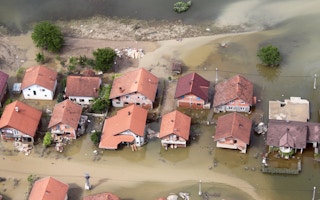About 1.6 billion people now live in climate change “vulnerability hotspots”, a number that could double by 2050 if fossil fuels continue being used at the rate they are today, scientists warned at the COP27 UN climate talks in Egypt.
That would put a third of the world’s population at risk of weather disasters, water and food shortages, displacement and other threats that could spur social instability, said Johan Rockström, director of the Potsdam Institute for Climate Impact Research in Germany.
Limiting global temperature rise as a result of climate change to 1.5 degrees Celsius (2.7 degrees Fahrenheit) - the more ambitious target of the 2015 Paris Agreement - “is not a goal, it is a physical limit”, he warned at a press conference.
“Go beyond it and we are likely to trigger tipping points,” such as irreversible melting of Greenland ice that could set in motion 7 metres (23 feet) of sea level rise over time, enough to swamp key coastal cities, he said.
Scientists, who have been issuing a drumbeat of increasingly frank reports and warnings about growing climate risks, are hoping to inject that urgency into UN climate negotiations that started this week in the Red Sea resort of Sharm el-Sheikh.
“
You can’t negotiate with the planet, you can’t negotiate with the atmosphere. You’re only hurting yourself if you underestimate the power of Earth systems.
Johan Rockström, director, Potsdam Institute for Climate Impact Research
With fossil fuel emissions still rising, despite a need for them to fall by 45 per cent within eight years to keep the 1.5C goal alive, scientists are thinking about how to better grab attention to enact change.
“How we can deliver this message and try to attract more action?” said Mercedes Bustamante, an ecologist at the University of Brasilia.
List of insights
At COP27 on Thursday, leading climate scientists presented a list of 10 insights into the latest global warming science, in simple language and tailored toward policy suggestions - a far cry from the data-heavy science reports once delivered at COP meetings.
Among the key points, they said the ability of people to adapt to coming climate impacts is limited - which means faster emissions cutting is crucial - and worrying new climate-related health threats are on the rise, including from heat extremes.
“We know from COVID our health systems are really unprepared for shocks and stresses. Climate change is a major shock and stress already affecting many of our countries,” said Kristie Ebi, a specialist in global warming impacts on health at the University of Washington.
In addition, climate change impacts - from slow-moving crises such as drought and sea level rise to weather disasters - are increasingly displacing people from their homes and worsening conflict threats, the scientists said.
“Climate change, while not a direct cause of conflict, is an amplifier of social instabilities,” Rockström said.
Broadly, “human security requires climate security” the list of insights noted.
“If we want to have a secure and peaceful future we need to address climate change very rapidly,” Rockström said.
Reducing forest losses and other land degradation is also key, scientists say, as nature and soils currently soak up a quarter of the world’s emissions, effectively keeping planet-heating carbon dioxide out of the atmosphere.
As well, to effectively tackle warming, societies need to move away from GDP growth as a measure of success and use “human well-being” as the key indicator, a move that would “factor in the true human cost of climate change,” Rockström said.
Ensuring local people have a major say in what climate-resilient development should look like in their communities is also crucial to ensuring limited money is effectively spent, the scientists said.
Finance revamp
Lastly, a major shift from incremental change to a fundamental revamp of how global finance works - something being widely discussed at COP27 - is crucial to ensuring needed money flows to climate-smart projects, not damaging ones, they said.
“All the good work on sustainable finance is still operating within the current existing business models, which are not substantially shifting the allocation of capital to meaningful mitigation,” Rockström said.
Changes are “only scratching on the surface … not shifting financial flows at the pace and scale required”, he added.
One thing that could help, Rockström said, is putting an economic price on the cost of emitting climate-changing pollution that reflects its damage - a cost likely in the range of $200 per tonne of pollution emitted.
Current carbon prices are much lower, with the highest, in Europe, at no more than $100 per tonne.
A higher price would give businesses “very clear signals where we need to innovate and reform,” Rockström said.
His overall message for negotiators from nearly 200 countries at COP27, he said, was that they should not ignore clear scientific warnings about the risks of climate inaction.
“You can’t negotiate with the planet, you can’t negotiate with the atmosphere,” he said. “You’re only hurting yourself if you underestimate the power of Earth systems.”
This story was published with permission from Thomson Reuters Foundation, the charitable arm of Thomson Reuters, that covers humanitarian news, climate change, resilience, women’s rights, trafficking and property rights. Visit https://www.context.news/.










